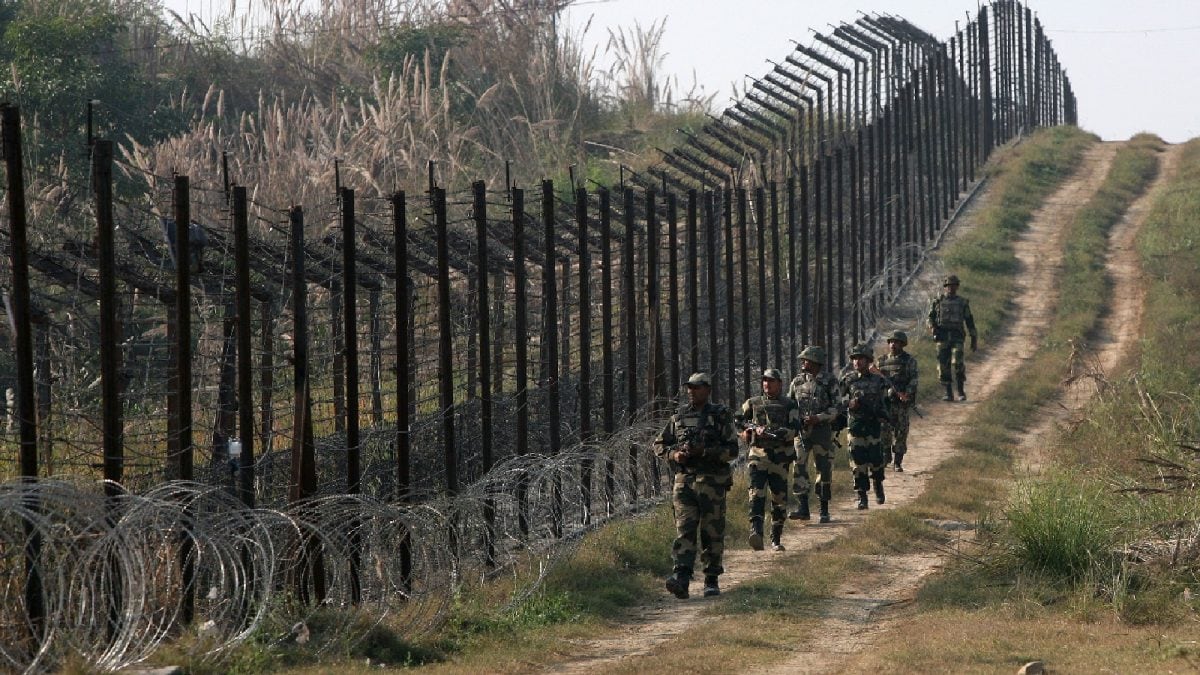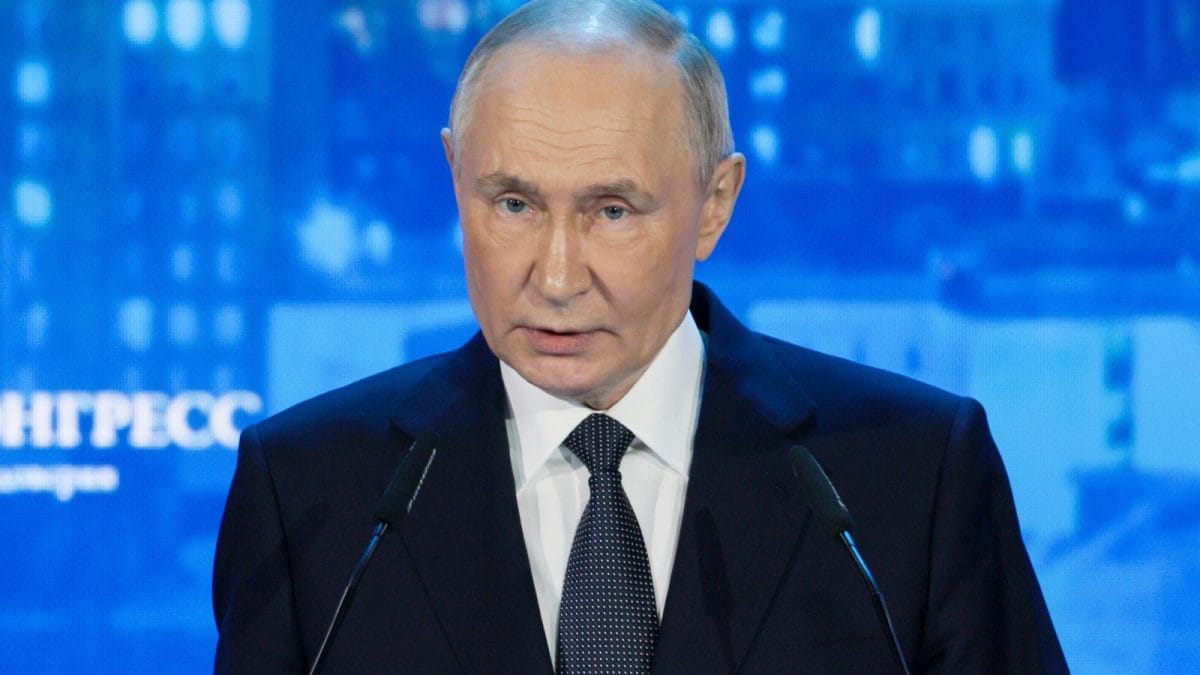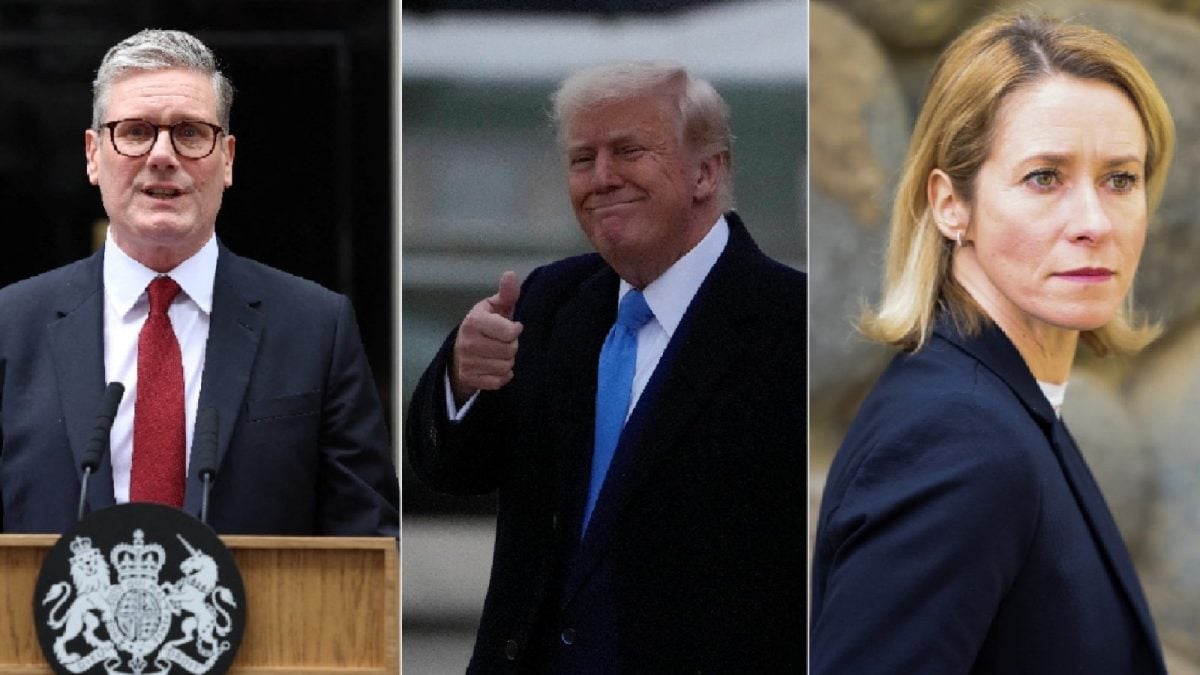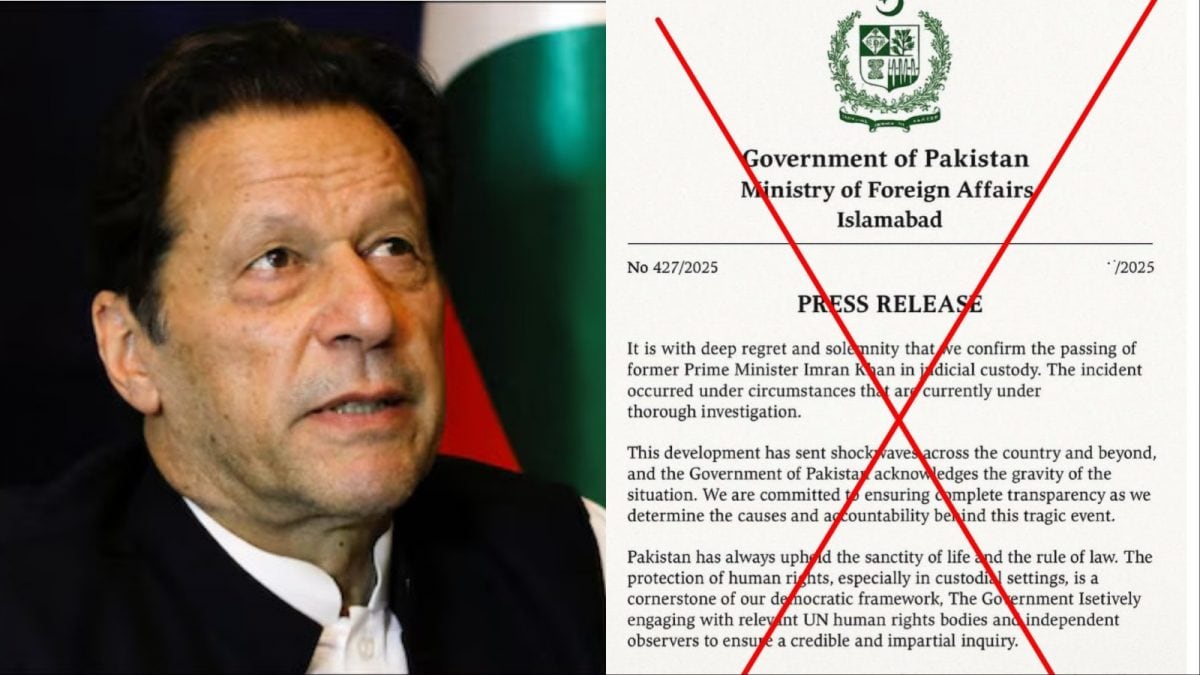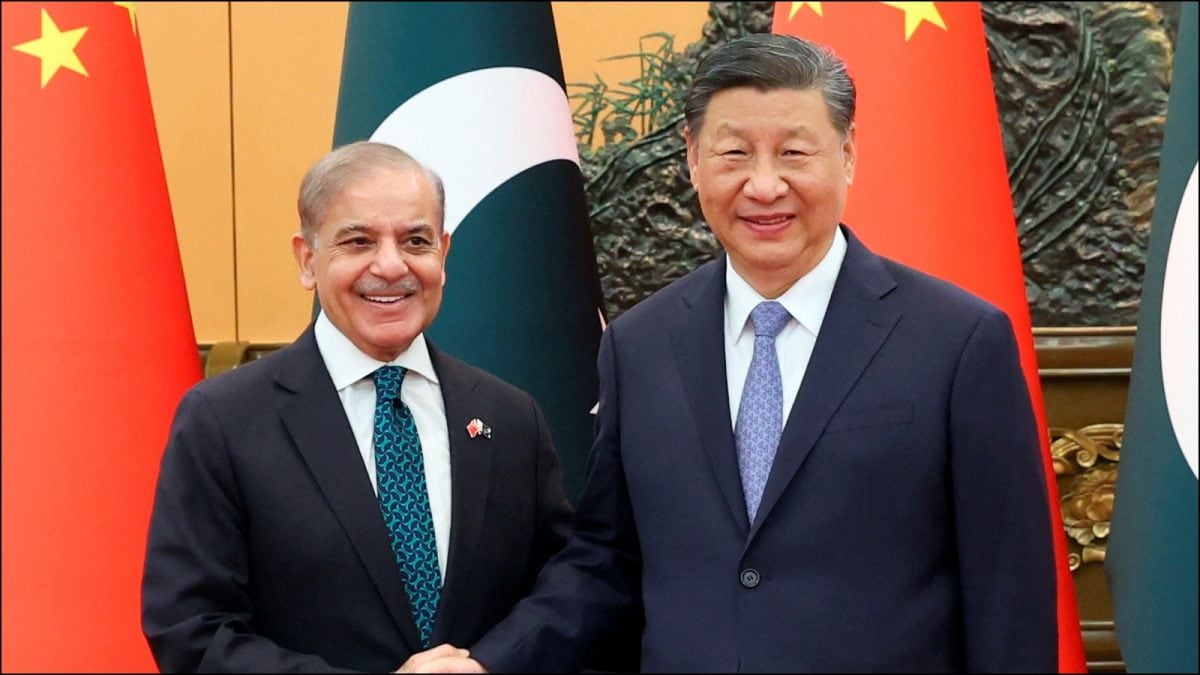Last Updated:April 07, 2025, 15:00 IST
Global stock markets plummeted after China imposed retaliatory tariffs following President Trump's 54% duty on Chinese imports. Hong Kong, Frankfurt, Taipei, and Tokyo saw significant losses

On Wednesday, Trump announced an additional 34% tariff on all Chinese goods imported into the US (Photo: X)
Global stock markets were in turmoil on Monday after China announced retaliatory tariffs in response to President Donald Trump’s increase in duties on Chinese imports to 54%.
Trading floors were inundated with a wave of selling as investors sought refuge, leading to Hong Kong’s steepest decline in nearly 30 years at 13 percent. Frankfurt plummeted 10 percent, Taipei 9.7 percent, and Tokyo almost eight percent. Wall Street futures were also hit hard, and commodities tumbled.
President Trump’s announcement of sweeping tariffs against US trading partners triggered last week’s market chaos. He justified the move, claiming years of unfair trade practices and asserting that governments were eager to negotiate with Washington.
However, after Asian markets closed on Friday, China declared it would impose retaliatory tariffs of 34 percent on all U.S. goods starting April 10.
Here’s How Countries & Their Stock Markets Responded To Trump’s Tariffs
China
In mainland China, where markets reopened after a public holiday, the Shanghai Composite Index closed 7.3% lower, while the blue-chip CSI300 index dropped about 7%. In Hong Kong, the benchmark Hang Seng index last traded nearly 12% lower.
On Wednesday, Trump announced an additional 34% tariff on all Chinese goods imported into the US, raising duties on all Chinese imports to well over 54% when existing tariffs are considered. In response, Beijing on Friday imposed its own baseline 34% tariffs on all American imports, along with other measures like export controls on rare earth minerals used in high-tech products, such as computer chips and electric vehicle batteries, and trade restrictions on specific US companies.
Within 48 hours of Trump’s market-impacting tariffs announcement, the world’s second-largest economy responded swiftly with its own punitive measures on US goods and firms. The message is clear: China is well-prepared to endure a trade war and emerge stronger.
That message was telegraphed to China’s domestic audience and foreign countries alike in a flurry of state media coverage and government statements over the weekend following Trump’s epic assault on the global trading system.
“US tariffs will have an impact (on China), but ‘the sky won’t fall,’" a commentary in the ruling Chinese Communist Party’s mouthpiece People’s Daily said Sunday.
“Since the US initiated the (first) trade war in 2017 – no matter how the US fights or presses – we have continued to develop and progress, demonstrating resilience – ‘the more pressure we get, the stronger we become,’" read the commentary, which was also on the front page of the paper’s Monday edition.
India
Equity markets in India experienced significant declines on Monday, with benchmark indices falling over 5 percent in early trading due to a global downturn triggered by the reciprocal tariffs imposed by the US and China’s subsequent retaliation.
The Sensex plummeted 3,939.68 points or 5.22 percent, hitting an intraday low of 71,425.01, while the NSE Nifty dropped 1,160.80 points or 5 percent to 21,743.65 — marking its worst opening since March 2020, at the peak of the COVID-19 pandemic. This represented the most substantial single-day drop since June 4, 2024, when the indices had fallen more than 8 percent.
India does not plan to hit back at the US over the 26% reciprocal tariffs, a government official said, citing the ongoing trade deal talks between the two nations, news agency Reuters reported. The government of India has found a clause of Trump’s tariff order that offers a possible reprieve for trading partners who “take significant steps to remedy non-reciprocal trade arrangements", the official said.
According to this clause, the countries can be excused or get relief from the tariffs if they make efforts to fix unfair trade deals. Another official, who did not want to be named, said that New Delhi sees itself to be in a better place than other Asian nations like China, Vietnam and Indonesia, who have been hit by higher Trump tariffs, as India is one of the first nations to have already initiated talks with Washington over a trade deal – something the country considers an advantage.
Canada
Canada was largely spared from the global tariffs announced by Trump on Wednesday, as Washington granted an exemption for goods compliant with the US-Canada-Mexico free trade agreement, covering most products. However, Canada, one of America’s largest trading partners, still faces tariffs on steel, aluminum, and other products, in addition to levies on automobiles.
Prime Minister Mark Carney announced “25 percent tariffs on all vehicles imported from the United States that are not compliant with CUSMA," referring to the Canadian acronym for the existing North American free trade agreement. This followed Trump’s imposition of 25% tariffs on Canadian vehicles.
The Toronto Stock Exchange’s S&P/TSX composite index (.GSPTSE) fell 1,142.30 points, or 4.7%, to 23,193.47, its lowest closing level since September 10 and its biggest decline since March 2020 at the start of the COVID-19 crisis. Since Wednesday, when the U.S. unveiled sweeping tariffs on other countries, the index has lost 8.4%, while it posted a weekly decline of 6.3%.
Japan
Japan’s Nikkei 225 index plummeted 7.8 percent on Monday in line with global sell-off.
Prime Minister Shigeru Ishiba said that his government will present Trump with a “package" of measures to win relief from US tariffs.
Earlier, Trade minister Yoji Muto had described the 24 percent tariffs on Japanese exports to the United States as “extremely regrettable" and reiterated his strong request to Washington not to impose them on Japan.
Taiwan
Taiwanese stocks triggered a circuit breaker after plummeting nearly 10% on Monday, in the first trading session since President Donald Trump announced new import tariffs last week. Amid market chaos, Taiwan’s chief financial regulator stated that temporary restrictions on short-selling would be implemented throughout the week to prevent further instability caused by the tariffs.
Taiwan’s stocks dived 9.8 percent on Monday, as traders reacted to US President Donald Trump’s sweeping tariffs that triggered a massive selloff on world markets last week.
The Taiex, the weighted index on the Taiwan Stock Exchange, plunged 9.8 percent at the open, as trading resumed following a long weekend.
Taipei had sought to avoid Trump’s threatened tariffs by pledging increased investment in the United States and more purchases of US energy, but it was still hit by a 32 percent tax on its imports, excluding semiconductor chips.
Taiwanese President Lai Ching-te said Sunday the government did not plan to impose “retaliatory tariffs" on products from the United States, the island’s most important security backer. Instead, the government is seeking to strike a deal with Washington for zero tariffs, and has earmarked $2.7 billion to help domestic industries affected by the new tax.
Taiwan’s trade surplus with the United States is the seventh highest of any country, reaching $73.9 billion in 2024. Around 60 percent of Taiwan’s exports to the United States are ICT, which includes chips.
Vietnam
Vietnam, a manufacturing powerhouse that had the United States as its largest market last year, faced a hefty 46 percent tariff due to Trump’s global trade measures.
Last week, US President Donald Trump mentioned that Vietnam’s top leader expressed interest in negotiating on tariffs during a “very productive" call on Friday, following the imposition of significant levies on the Southeast Asian nation.
“Just had a very productive call with To Lam, General Secretary of the Communist Party of Vietnam, who told me that Vietnam wants to cut their Tariffs down to ZERO if they are able to make an agreement with the US," Trump said on Truth Social.
During Trump’s first term, Vietnam leveraged its strategic location and affordable skilled workforce to establish itself as an alternative manufacturing hub to China amidst the trade conflict between Beijing and Washington. This led many companies to relocate parts of their supply chain, resulting in Vietnam’s trade surplus with the United States doubling from 2017 to 2023.
However, major brands like Nike, which produced 50 percent of its footwear and 28 percent of its apparel in Vietnam in the 2024 financial year, are now facing significantly higher costs, which they must either absorb or transfer to customers.
On Friday, the Vietnamese stock market continued its decline, with the VN-Index nearing the 1,210-point mark due to increased selling pressure and ongoing foreign outflows.
The VN30-Index, which tracks the 30 largest listed companies by market capitalization, dipped 2.66 points, or 0.21 percent, to 1,280.52 points. The Vietnamese stock market is closed today, April 7, 2025, in observance of the Hung Kings’ Festival, a national public holiday.
European Union
European Union trade chief Maros Sefcovic said EU ministers will Monday weigh their response to a “paradigm shift" in international trade. “What we are going to discuss is how to position Europe in what I would describe as the paradigm shift of the global trading system," Sefcovic told reporters ahead of a meeting in Luxembourg.
After the 20 percent tariffs on EU exports to the United States, EU chief Ursula von der Leyen had said Brussels was “preparing for further countermeasures" but added it was “not too late to address concerns through negotiations".
Germany’s economy minister said the EU is in a ‘strong position to respond to US tariffs’.
UK
The FTSE 100 index of blue-chip stocks has plunged by 488 points, or 6%, taking the index down to 7566 points, its lowest level since February 2024.
UK Prime Minister Keir Starmer said “there would be an economic impact" from a 10 percent tariff imposed on British exports to the United States.
“Today, I will act in Britain’s interests with mine," said Starmer, adding that trade negotiations would continue with Donald Trump’s administration and that “we will fight for the best deal for Britain".
The UK will “remain calm, and committed" to sealing a trade deal with the United States which could help “mitigate" the tarriff rise, business minister Jonathan Reynolds said.
France
The French CAC was down 6% and the FTSE declined by 5.2%. French President Emmanuel Macron has called for a suspension of investment in the United States until Donald Trump’s “brutal and unfounded" new tariffs against Europe and the rest of the world were clarified.
“What would be the message if big European actors invest billions of euros in the US economy at the very moment they are hitting us?" Macron asked at a meeting of French companies.
Macron said Americans will be “weaker and poorer" after Trump’s tariff announcement, which he said would have a “massive impact" on the European economy.
Germany
Germany’s leading stock market index, the DAX, plummeted by around 10% at the start of trading on Monday, falling to 18,489 points as investors continue to react to the sweeping global tariffs imposed by the Trump administration.
New blanket 10% duties on all imports to the United States came into effect on Saturday, with additional levies on a host of trading partners due to be imposed on Wednesday, including a 20% tariff on imports from the European Union.
German Chancellor Olaf Scholz slammed the tariffs as “fundamentally wrong" as Berlin warned that the European Union could retaliate by targeting American tech titans.
“This is an attack on a trade order that has created prosperity all over the globe, a trade order that is essentially the result of American efforts," Scholz said.
Indonesia
Indonesia’s central bank said Monday it would “intervene aggressively" in the domestic market to defend its currency hit by US President Donald Trump’s sweeping tariffs.
Trading is set to resume Tuesday for the first time since Trump last week imposed levies on friends and foes alike, rattling stock markets and alarming governments around the world. Indonesian markets have been closed since March 28 for public holidays, with the rupiah falling to its lowest level against the US dollar since the late 1990s Asian financial crisis.
Trump’s “Liberation Day" announcement saw the archipelago nation hit with an additional 32 percent levy on its goods, higher than the baseline 10 percent for all countries and more than Southeast Asian neighbours Malaysia, Singapore and the Philippines.
President Prabowo Subianto said on Monday the country would negotiate with Washington to ask for a better deal.
The United States is one of Indonesia’s top trading partners, and Jakarta enjoyed a $16.8 billion trade surplus with Washington last year, according to Indonesian government data.
(With inputs from agencies)
Location : First Published:April 07, 2025, 15:00 IST
News business How Countries Are Responding To Trump's Tariffs As Global Markets Plunge?

 1 month ago
1 month ago

